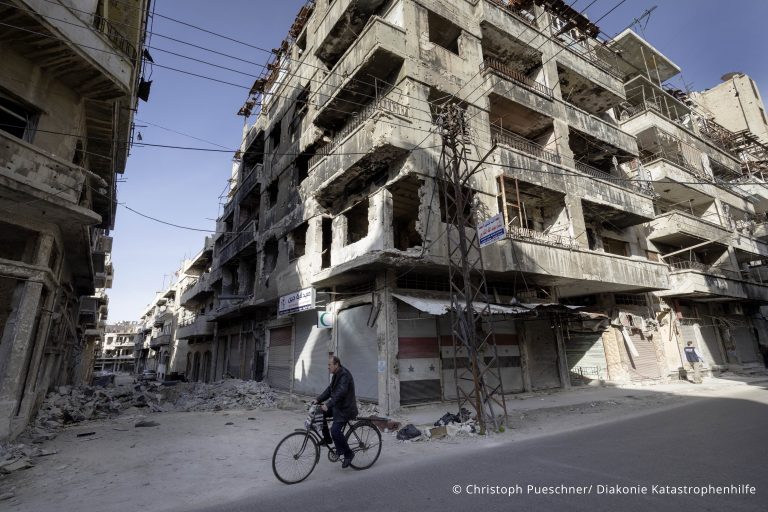| Date: | 18.06.2020 |
| Time: | 14:00 - 15:30 |
| Location: | online |
Ahead of the Brussels IV Conference on Syria Diakonie Katastrophenhilfe invite you to attend the webinar
Cash and Voucher Assistance in Syria: Opportunities and Challenges
Ten years into the conflict, the humanitarian needs in Syria remain high with millions of people depending on aid and support. Cash and voucher assistance (CVA) is one possible way to respond to these immense needs. It is considered as a particularly dignified and empowering form of humanitarian assistance allowing crisis-affected households the freedom to prioritize their needs. Additionally, cash and voucher modalities are a crucial instrument to support the early recovery of both communities and markets.
Much progress has been made since the Grand Bargain asked for an increased use of cash based programming and an increase in available funding for local organizations. While many humanitarian crises have since seen an increase in CVA activities, the Cash Assistance in Re-Emerging Markets in Syria (CARMA) Consortium is still one of the few CVA projects of its kind. This consortium, which consists of Diakonie Katastrophenhilfe and Caritas Switzerland together with Caritas Austria and Cordaid, as well as Caritas Syria and GOPA-DERD as local partners, is implementing an ECHO funded CVA project in Syria. At present, the donor community has different views on the use of CVA in Syria. Despite global Grand Bargain commitments on localisation, donor-funding strategies do not yet seem to entirely reflect this in the Syrian context.
The event highlights opportunities and challenges of CVA in the Syrian conflict setting, a setting that is highly politicized, suffers from unstable markets, is affected by international sanctions, a deepening economic crisis and varying donor approaches. Despite these challenges and with the help of our panelists, we want to shed light on enabling factors for CVA at a programmatic, coordination, institutional and political level while also bringing to the attention the specific role of local actors.
Speakers
- Saima Nazish: CVA Adviser for Asia at Diakonie Katastrophenhilfe, Amman
Based in the Diakonie Katastrophenhilfe regional office in Jordan, Saima has long-standing experience of working in Asia and on CVA programmes. Saima will present key requirements for making local partners in Syria and the region “cash-ready”, and will reflect on opportunities and challenges in working with local partner organizations.
- Elsy Ghanameh: Deputy Chief of Party at Caritas Switzerland, Damascus
Based in Damascus, Elsy supports the setup, administration, management, and monitoring of a cash-based intervention led by the CARMA consortium in Syria. Additionally, on behalf of Caritas Switzerland, she is supporting in coordination among the Central Syrian cash actors. Elsy will discuss the daily challenges of implementing CVA activities in Syria and will give insight into the achievements of coordination efforts concerning e.g. the standardization of approaches.
- ECHO representative: Tbc
- Ralf Südhoff: Founding Director of the Centre for Humanitarian Action (CHA), Berlin
Ralf’s research focus includes humanitarian reform and monetary policy, the Syria crisis and the MENA region. Ralf will reflect on donor politics and the implications of international policies on the work in Syria. Before joining CHA, Ralf was the Director of the WFP Regional Office for the Syria Crisis in Jordan, as well as Head of the WFP Office in Berlin and Head of the External Relations Division at WHO.
Facilitation
- The webinar will be moderated by Claudia Puschner, Global Cash Advisor at Diakonie Katastrophenhilfe.
To receive the link to the webinar via confirmation email, as well as a short documentation after the event, please register here.
Please note that the webinar will be recorded. Your registration indicates consent. Zoom allows for anonymous participation.



